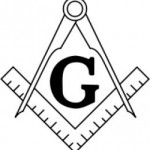Freemasonry & Judaism are compatible
By Rt. Wor. Bro. Rabbi Dr Raymond Apple, AO RFD, Past Deputy Grand Master of the United Grand Lodge of New South Wales & the Australian Capital Territory.
 Freemasonry is the oldest and best known of the world’s fraternal organisations. It claims to be as old as the Bible.
Freemasonry is the oldest and best known of the world’s fraternal organisations. It claims to be as old as the Bible.
In its present form it arose in the Middle Ages when stonemasons worked together, often for years at a time, on building great castles and cathedrals, developing a strong bond of comradeship and honouring high standards of craftsmanship. In due course “speculative” members were accepted into the movement – i.e. men who were not necessarily “operative” or active builders but espoused the Masonic ideals and used masons’ tools, especially the square and compasses, to symbolise the right way of regulating human conduct and building an ethical world.
Especially in English-speaking countries, the movement has always had a high proportion of eminent Jewish members, including leading rabbis. Among present day Australian rabbis, high masonic office is held by Rabbi Shalom Coleman of Perth, Rabbi Chaim Gutnick of Melbourne and myself in Sydney. Other rabbis and ministers are past masters of their lodges.
All this clearly indicates that Jews have not found freemasonry to be incompatible with their Judaism. Why Jewish masons feel at home with the movement includes the requirement that a mason must believe in God, and the fact that the Bible occupies a place of honour in the lodge room.
Masonic ritual is based largely on biblical words, events and personalities, and the overall emphasis is on ethics, friendship and good works.
Admittedly, some of the Hebrew words that figure in Masonic ceremonies are mispronounced and the references to biblical events occasionally get their history wrong, but these are regarded by Jewish freemasons as incidental issues. No major challenge to Jewish faith is seen in being a mason or in promoting its ideals.
It has often been otherwise among Christians. For a long period, masonry and the Roman Catholic Church lived in a state of conflict or, at best, of uneasy truce, though the Catholic position is now increasingly positive. In recent years, however, the Church of England has taken up a critical attitude to the movement, both in Britain and elsewhere in the Anglican communion.
In 1988, the synod of the Anglican Church in Australia declared freemasonry to be “basically incompatible with Christianity”.
The Christian problem with freemasonry is both general (there is an incorrect perception that the movement is a rival religion), and particular, in that it makes no reference to Jesus or the New Testament, at least in the basic three degrees through which most masons progress.
Masonry responds by insisting that it is religious without being a religion and that it fosters a generally religious attitude to life, but has no theological doctrines, mandatory interpretations or modes of worship.
It defines itself as “a peculiar system of morality, veiled in allegory and illustrated by symbols”. It is not a church or synagogue; it does not compete with church or synagogue; and it urges masons to be fully committed and practising members of whatever faith group they adhere to.
The omission of Jesus and the New Testament is implicit in the fact that freemasonry is open to men of all faiths. Jews, Muslims, Hindus and others are as welcome as Christians. But each comes to masonry with his own religious beliefs and commitments, and when he hears the word “God” in lodge ritual, he attaches to it his own theological interpretation.
A Jew will understand the divine name in terms of the pure, indivisible monotheism of Judaism: to him, “God” is HaShem. A Christian is free to import into the word “God” his own Christian concepts and understanding.
The history of freemasonry suggests a major and tragic paradox. In parts of continental Europe, especially 19th-century Germany, there were major objections to Jewish membership of the movement.
Antisemitism was then endemic in sections of German freemasonry. Yet the antisemite was never rational or consistent, and before long freemasonry was regularly attacked as “too Jewish”, and therefore dangerous to society.
Accusations of Jewish-masonic plots to undermine and control the world played a role in the Dreyfus affair. They surfaced in that notorious forgery, “The Protocols of the Elders of Zion”. And the German right wing and the Nazis added similar accusations to their antisemitic armoury.
To Jews, the right to join freemasonry became a touchstone of religious liberty, an agent of emancipation and social integration. Hence, in the free atmosphere of British countries, Jews were well represented in lodge memberships, and Jewish community leaders were prominent masons.
Whether Masonic involvement is growing or declining among Jews is difficult to tell; statistics do not exist, though it could be a useful subject for research. But whatever the numbers, Jewish masons are proud of their contribution to freemasonry, and proud of the friendships and ethical inspiration they have gained from the movement.
For more articles on Freemasonic issues by Rt. Wor. Bro. Rabbi Dr Raymond Apple, AO RFD, visit his Freemasonry webpage.
 EDUCATION BY DEGREES: MASONIC NOTES
EDUCATION BY DEGREES: MASONIC NOTES
Rt. Wor. Bro. Rabbi Dr Raymond Apple’s book on the history, symbolism and teachings of Freemasonry, enlivened with personal reminiscences and humour.
Order the paperback or Kindle edition from Amazon or the paperback from The Book Depository to receive free shipping. Selections from the book can be previewed on Google Books.



